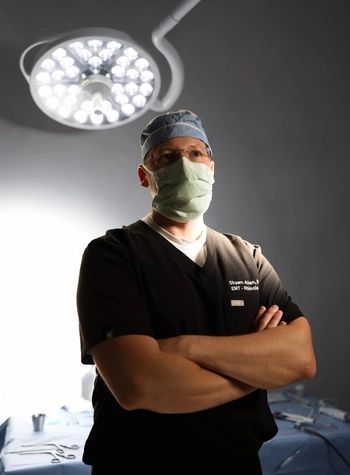Dr. Shawn Allen has either authored or reviewed and approved this content.
Page Updated:Breathe better, sleep better, feel better!
Sinus headaches are an uncomfortable symptom of conditions such as sinusitis, rhinosinusitis, or allergic rhinitis that resolve when sinus congestion is effectively treated. In general, this term refers to localized pressure and pain within the areas that sinuses are subjectively felt, such as the cheeks (maxillary sinuses), forehead (frontal sinuses), eyes (ethmoid sinuses), and crown of the head (sphenoid sinuses). However, it is common for patients to report sinus headaches when they are actually suffering from migraines or other types of headaches. Board-Certified Otolaryngologist (ENT) and fellowship-trained Rhinologist Dr. Shawn Allen can effectively diagnose the source of patients’ sinus and head pain, and provide proper and effective treatment for patients from Houston, The Woodlands, and surrounding areas.


“Sinus headache” is a term frequently used to refer to symptoms caused by sinus congestion that may
Trusted Source
Sinus Headaches
Mayo Clinic
Go to Source
include
:
Trusted Source
Sinus Headache: Diagnosis and Dilemma?
Maurya A, Qureshi S, Jadia S, Maurya M
Go to Source
Research shows
that sinus headaches are often inappropriately diagnosed, leading to insufficient or unnecessary treatments that may be harmful, costly, and frustrating for patients. In fact, up to
Trusted Source
Your sinus headache may not be what you think
Mayo Clinic Health System
Go to Source
90% of patients
who report symptoms of a sinus headache are actually experiencing migraines, tension headaches, or other causes of discomfort unrelated to their sinuses.
Migraine headaches and sinusitis-related headaches have similar and often overlapping symptoms. According to the American Migraine Foundation,
Trusted Source
Sinus Headache
American Migraine Foundation
Go to Source
45%
of migraine patients experience nasal congestion, watery eyes, or other symptoms often associated with nasal or sinus problems. However, certain symptoms are unique to each. For example, headaches from a bacterial sinus infection often present with a runny nose, and the drainage ranges from clear to discolored and thin to thick and sticky. On the other hand, migraine headaches may cause a runny nose with thin, clear mucous more consistent with rhinitis from allergies in addition to other sinus or nasal symptoms. Additional differences between sinus headaches and migraines include:

Nasal and sinus congestion caused by allergies may certainly cause a feeling of pressure or pain in the sinuses. However, allergy treatments such as antihistamines and decongestants that alleviate sinus congestion from allergies do not relieve headache pain from other more common sources of headaches. Frequently, these sinus headaches that accompany allergy symptoms are a separate condition and should be treated as such.
If a patient’s symptoms are the result of sinusitis (a sinus infection) or rhinosinusitis, over-the-counter treatments can often alleviate symptoms. Treatments may include:
When symptoms of sinusitis or an upper respiratory infection last longer than a week, Dr. Allen will prescribe medications that may include:
In cases where a patient’s chronic sinusitis or nasal congestion is not responsive to the above treatments, Dr. Allen will perform surgery to clear debris from the sinuses, improve sinus drainage, or to address anatomical defects such as a deviated septum or nasal polyps. Procedures are not needed in the absence of significant sinus disease or nasal deformities with airflow obstruction, and may in fact worsen the frequency or severity of headaches at least short-term. Surgical procedures performed to treat chronic sinusitis or nasal obstruction leading to sinus headaches include:
This procedure is performed through the nostrils to enlarge the sinus openings, clear sinus debris, blockages, or nasal polyps, and/or allow access for topical medications within the sinuses.
Learn More About Endoscopic Sinus Surgery
This minimally invasive, in-office procedure is performed either under sedation or awake to gently enlarge the openings of the frontal, maxillary, and sphenoid sinuses and to allow them to be cleared of debris.
Learn More About Balloon Sinuplasty
Septoplasty, or deviated septum repair, is performed to straighten and support a deviated septum that can contribute to chronic sinusitis and impaired nasal breathing.
Turbinates are structures inside the nasal passages that humidify and cleanse air breathed through the nose. The turbinates can become enlarged due to allergies, infection, irritation, or decongestant abuse, which can cause nasal obstruction and congestion that progressively worsens. Turbinoplasty, or inferior turbinate reduction, significantly improves airflow through the nose.

Sinus headaches caused by sinus infections are improved by effectively treating the underlying sinus and nasal problems with proper medications and surgical procedures when necessary. Other causes of headaches such as migraines are more common than sinus problems, and appropriate workup and testing can identify the precise causes and most appropriate treatments without going through unnecessary medications or procedures that are unlikely to provide relief . If you live in Houston, The Woodlands, or nearby areas and suffer from pain and pressure in the face and head, Dr. Shawn Allen can conduct a thorough examination and obtain appropriate tests so that the source of your discomfort can be properly diagnosed and treated. To schedule a consultation with Dr. Allen, please contact us.
1 Mayo Clinic. Sinus Headaches. Available: https://www.mayoclinic.org/diseases-conditions/sinus-headaches/symptoms-causes/syc-20377580#:~:text=Sinus%20headaches%20are%20usually%20associated,not%20be%20treated%20with%20antibiotics. Accessed January 24, 2023.
2 Maurya A, Qureshi S, Jadia S, Maurya M. “Sinus Headache”: Diagnosis and Dilemma?? An Analytical and Prospective Study. Indian J Otolaryngol Head Neck Surg. 2019 Sep;71(3):367-370. doi: 10.1007/s12070-019-01603-3. Epub 2019 Jan 19. PMID: 31559205; PMCID: PMC6737117. Available: https://pubmed.ncbi.nlm.nih.gov/31559205/. Accessed January 24, 2023.
3 Mayo Clinic Health System. Your sinus headache may not be what you think. Available: https://www.mayoclinichealthsystem.org/hometown-health/speaking-of-health/your-sinus-headache-may-not-be-what-you-think. Accessed January 24, 2023.
4 American Migraine Foundation. Sinus Headache. Available: https://americanmigrainefoundation.org/resource-library/sinus-headache/. Accessed January 24, 2023.
Dr. Shawn Allen has either authored or reviewed and approved this content.
Page Updated: